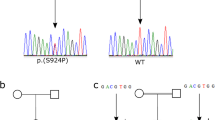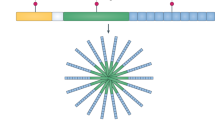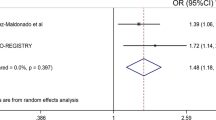Abstract
We investigated the hypothesis that low-penetrance mutations in genes (TNFRSF1A, MEFV and NALP3/CIAS1) associated with hereditary periodic fever syndromes (HPFs) might be risk factors for AA amyloidosis among patients with chronic inflammatory disorders, including rheumatoid arthritis (RA), juvenile idiopathic arthritis (JIA), Crohn's disease, undiagnosed recurrent fevers and HPFs themselves. Four of 67 patients with RA plus amyloidosis had MEFV variants compared with none of 34 RA patients without amyloid (P value=0.03). The E148Q variant of MEFV was present in two of the three patients with TNF receptor-associated periodic syndrome (TRAPS) complicated by amyloid in two separate multiplex TRAPS families containing 5 and 16 affected members respectively, and the single patient with Muckle–Wells syndrome who had amyloidosis was homozygous for this variant. The R92Q variant of TNFRSF1A was present in two of 61 JIA patients with amyloidosis, and none of 31 nonamyloidotic JIA patients. No HPF gene mutations were found in 130 healthy control subjects. Although allelic variants in HPFs genes are not major susceptibility factors for AA amyloidosis in chronic inflammatory disease, low-penetrance variants of MEFV and TNFRSF1A may have clinically significant proinflammatory effects.
This is a preview of subscription content, access via your institution
Access options
Subscribe to this journal
Receive 6 digital issues and online access to articles
$119.00 per year
only $19.83 per issue
Buy this article
- Purchase on Springer Link
- Instant access to full article PDF
Prices may be subject to local taxes which are calculated during checkout

Similar content being viewed by others
References
Merlini G, Bellotti V . Molecular mechanisms of amyloidosis. N Engl J Med 2003; 349: 583–596.
McDermott MF, Aksentijevich I . Autoinflammatory syndromes. Curr Opin Allergy Clin Immun 2002; 2: 511–516.
McDermott MF . Genetic clues to understanding periodic fevers and possible therapies. Trend Mol Med 2002; 12: 550–554.
Kastner DL . Familial Mediterranean fever: the genetics of inflammation. Hosp Pract (Off Ed) 1998; 33: 131–140, 143.
Sohar E, Gafni J, Pras M, Heller H . Familial Mediterranean fever: a survey of 470 cases and review of the literature. Am J Med 1967; 43: 227–253.
Mimouni A, Magal N, Stoffman N et al. Familial Mediterranean fever: effects of genotype and ethnicity on inflammatory attacks and amyloidosis. Pediatrics 2000; 105: E70.
Cazeneuve C, Ajrapetyan H, Papin S et al. Identification of MEFV-independent modifying genetic factors for familial Mediterranean fever. Am J Hum Genet 2001; 67: 1136–1143.
Saatci U, Ozen S, Ozdemir S et al. Familial Mediterranean fever in children: report of a large series and discussion of the risk and prognostic factors of amyloidosis. Eur J Pediatr 1997; 156: 619–623.
Ozen S . Familial Mediterranean fever: revisiting an ancient disease. Eur J Pediatr 2003; 162: 449–454.
Gillmore JD, Lovat LB, Persey MR, Pepys MB, Hawkins PN . Amyloid load and clinical outcome in AA amyloidosis in relation to circulating concentration of serum amyloid A protein. Lancet 2001; 358: 24–29.
Booth DR, Lachmann HJ, Gillmore JD, Booth SE, Hawkins PN . Prevalence and significance of the familial Mediterranean fever gene mutation encoding pyrin Q148. Q J M ed 2001; 94: 527–531.
Gershoni-Baruch R, Brik R, Zacks N, Shinawi M, Lidar M, Livneh A . The contribution of genotypes at the MEFV and SAA1 loci to amyloidosis and disease severity in patients with familial Mediterranean fever. Arthritis Rheum 2003; 48: 1149–1155.
Aksentijevich I, Galon J, Soares M et al. The tumor-necrosis-factor receptor-associated periodic syndrome: new mutations in TNFRSF1A, ancestral origins, genotype–phenotype studies, and evidence for further genetic heterogeneity of periodic fevers. Am J Hum Genet 2001; 69: 301–314.
Aganna E, Martinon F, Hawkins PN et al. Association of mutations in the NALP3/CIAS1/PYPAF1 gene with a broad phenotype including recurrent fever, cold sensitivity, sensorineural deafness, and AA amyloidosis. Arthritis Rheum 2002; 46: 2445–2452.
Tunca M, Akar S, Hawkins PN et al. The significance of paired MEFV mutations in individuals without symptoms of familial Mediterranean fever. Eur J Hum Genet 2002; 10: 786–789.
Lender M, Wolf E . Incidence of amyloidosis in rheumatoid arthritis. Scand J Rheumatol 1972; 1: 109–112.
Livneh A, Langevitz P, Zemer D et al. The changing face of FMF. Semin Arthritis Rheum 1996; 26: 612–627.
Elliott-Bryant R, Cathcart ES . Amyloid enhancing factor and dietary transmission in accelerated amyloid A amyloidosis. Clin Immunol Immunopathol 1998; 88: 65–69.
Trevitt CR, Singh PN . Variant Creutzfeldt-Jakob disease: pathology, epidemiology, and public health implications. Am J Clin Nutr 2003; 78 (Suppl 3): S651–S656.
Hoffman HM, Wanderer AA, Broide DH . Familial cold autoinflammatory syndrome: phenotype and genotype of an autosomal dominant periodic fever. J Allergy Clin Immunol 2001; 108: 615–620.
McDermott, MF, Aksentijevich I, Galon J et al. Germline mutations in the extracellular domains of the 55 kDa TNF receptor (TNF-R1) define a family of dominantly inherited autoinflammatory syndromes. Cell 1999; 97: 133–144.
Livneh A, Langevitz P, Shinar Y et al. MEFV mutation analysis in patients suffering from amyloidosis of familial Mediterranean fever. Amyloid 1999; 6: 1–6.
Acknowledgements
We are particularly grateful to the patients who agreed to participate in the study. This work was supported in part by the Special Trustees of Barts and the London Joint Research Board and the Wellcome Trust (to MMcD), The Finska Lakaresallskapet (TP) and the Research Funds of Helsinki University Hospital (AR, TP), the Medical Research Council, UK (to PNH).
Author information
Authors and Affiliations
Corresponding author
Additional information
Electronic-Database Information
URLs for data in this article are as follows:
Online Mendelian Inheritance in Man (OMIM), http://www.ncbi.nlm.nih.gov/Omim (for FCU/FCAS [MIM 120100], FHF [MIM 142680], FMF [MIM 249100], HIDS [MIM 260920], and MWS [MIM 191900])
Rights and permissions
About this article
Cite this article
Aganna, E., Hawkins, P., Ozen, S. et al. Allelic variants in genes associated with hereditary periodic fever syndromes as susceptibility factors for reactive systemic AA amyloidosis. Genes Immun 5, 289–293 (2004). https://doi.org/10.1038/sj.gene.6364070
Received:
Revised:
Accepted:
Published:
Issue Date:
DOI: https://doi.org/10.1038/sj.gene.6364070
Keywords
This article is cited by
-
Targeting NLRP3 inflammasome as a chief instigator of obesity, contributing to local adipose tissue inflammation and insulin resistance
Environmental Science and Pollution Research (2021)
-
Anti-interleukin 1 treatment in secondary amyloidosis associated with autoinflammatory diseases
Pediatric Nephrology (2016)
-
Canakinumab efficacy and long-term tocilizumab administration in tumor necrosis factor receptor-associated periodic syndrome (TRAPS)
Rheumatology International (2015)
-
Rutin modulates ASC expression in NLRP3 inflammasome: a study in alcohol and cerulein-induced rat model of pancreatitis
Molecular and Cellular Biochemistry (2014)
-
Systemic-onset juvenile idiopathic arthritis complicated by early onset amyloidosis in a patient carrying a mutation in the MEFV gene
Rheumatology International (2012)



